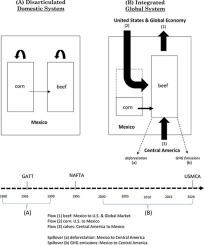Global Environmental Change ( IF 8.6 ) Pub Date : 2022-03-05 , DOI: 10.1016/j.gloenvcha.2022.102486 Yankuic Galvan-Miyoshi 1 , Cynthia Simmons 2 , Robert Walker 3, 3 , Gilberto Aranda Osorio 4 , Pedro Martinez Hernandez 4 , Ema Maldonado-Simán 4 , Barney Warf 5 , Marta Astier 6 , Michael Waylen 2

|
This article analyzes how trade liberalization in Mexico, particularly following the North American Free Trade Agreement (NAFTA), has transformed that nation’s cattle economy into a feedlot system manifesting multiple telecouplings and based on the transnational provision of inputs. A conceptual model is presented that suggests how environmental effects involving land use and GHG emissions emerge from changes in the beef supply chain. The article then presents an empirical analysis establishing that the production of corn and beef has intensified in the wake of NAFTA, and that deforestation rates have declined over the same period. Evidence is also presented showing that this has not precipitated a land sparing effect, given the leakage of deforestation into Central America, which supplies Mexican feedlots with 36 % of their source materials. The article calculates associated GHG emissions and establishes that enteric fermentation dominates deforestation as a source, and that ∼14% of GHGs produced by the post-NAFTA Mexican supply chain are emitted in Central America. This raises accounting questions for signatories to the Paris Climate Treaty, given commitments are nation-based.
中文翻译:

全球化供应链:墨西哥牛肉经济中的新兴远程耦合和环境泄漏
本文分析了墨西哥的贸易自由化,特别是在北美自由贸易协定 (NAFTA) 之后,如何将该国的养牛经济转变为一个饲养场系统,该系统体现了多个远程耦合并基于跨国提供的投入。提出了一个概念模型,该模型表明牛肉供应链的变化如何产生涉及土地使用和温室气体排放的环境影响。然后,文章提出了一项实证分析,表明在北美自由贸易协定之后玉米和牛肉的生产有所增加,而同期森林砍伐率有所下降。还提供的证据表明,考虑到森林砍伐渗入中美洲,这并没有促成土地节约效应,中美洲为墨西哥饲养场提供了 36% 的原材料。这篇文章计算了相关的温室气体排放量,并确定肠道发酵在森林砍伐中占主导地位,并且北美自由贸易协定后墨西哥供应链产生的 14% 的温室气体是在中美洲排放的。鉴于承诺是基于国家的,这对《巴黎气候条约》的签署方提出了会计问题。











































 京公网安备 11010802027423号
京公网安备 11010802027423号